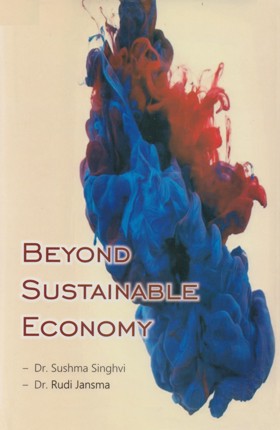Hoarding or accumulation of goods is generally seen as 'parigraha' and is prohibited in the light of Jain philosophy. However if we look deep into the reason behind this prohibition, it is rather a prohibition of usage, consumption and expense or conversion of energy.
We may very well visualize that any item under hoarding consumes energy right from its invention, design, production, sales, storage, preservation and final usage. It is interesting to note that energy is consumed even prior to the hoarding in the proper sense, and after it as well. Hence the core of parigraha is energy usage.
If one buys an (extra) shirt, the parigraha involved in it means consumption of energy for all activities - from the sowing of cotton seeds, production of the crop, plucking the cotton fibers, cleaning, spinning, weaving, dyeing, stitching, transportation up to sale on the market and maintaining the wardrobe and laundry. Every step of energy consumption creates an imbalance in the ecological sense. However, the exception, and the only one, is the direct use of naturally available energy, such as sun and wind energy. It is important here to note that indirect use of natural energy adversely affect the ecosystem of the planet as well. For example a solar heater or wind mill, apart for their production, generate electric energy for final usage, which involves pollution.
We may safely guess that 99.9 % of the energy we use is damaging the fabric of mother nature.
It is evident therefore that ideally we should stay naked and live as people of the stone age, or as animals do even now. However we seem to have reached a point of no return. So we can do no more than try to take this heavy wheel of parigraha to the top of the high mountain called aparigraha. The level of aparigraha is different for every individual, depending on the realization of its need and the amount of sacrifice one is willing to make. But the application of aparigraha is very wide-ranging. Even hoarding of a piece of bread or eating one more than is needed is aparigraha.
Every 'creation' even by 'God' and of any non-living creation' by us or other creatures adds to aparigraha in two categories with a few examples:
1. Direct aparigraha
- Minimize the need of food, shelter and cloths.
- Periodically review and mentally reclassify 'necessities' into 'luxuries.'
- Minimize the luxuries.
- Optimize quantities of consumption.
- Adopt the 'Parsi religious way' for the disposal of dead human bodies, e.g. give them as food for the vultures or other creatures.
- Minimize public need of infrastructure.
- Make every village, town and city self-sufficient.
- Optimize the use of water. Fifty years ago no one talked about this. Now it is a global issue. It has been said that the next world war may be for water. Overuse or misuse of water is parigraha, like that of any other commodity.
- Reduce the world population growth rate: either zero or even negative.
- Optimize industrial and agricultural production. Parigraha in the form of accumulation and storage of food by the governments is a massive problem today.
- Optimize your own age. First define the 'aim of life' and make a schedule. Accomplish the aim and say good-bye to the world. One continues to consume as long is one is alive. This too ought to be optimized.
- Consider yourself a 'dharti-ka-bojh' ('weight on the Earth') for the period you are not striving for a pious cause. It is a privilege of human beings only, and of no other creatures, to aim for a high-level goal.
- Keep a perfect 'total health': biological, mental and spiritual. This helps in two ways: 1. One is able to accomplish one's duty efficiently, and 2. One doesn't need to use energy in the form of medicine or medical treatment.
- Reverse the definitions of 'developing' and 'developed' country based on energy per capita. A developed country shall be one which consumes a predetermined 'minimum energy per capita.'
- Minimize unnatural conversion of energy. The creation of clouds from the evaporation of water from the ocean is natural conversion, but producing steam for a locomotive engine is an unnatural conversion of energy.
 Dr. Rudi Jansma
Dr. Rudi Jansma
 Suresh Ranka
Suresh Ranka
